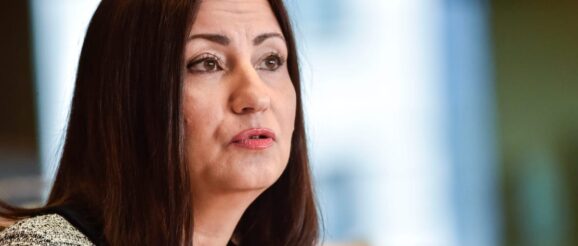6 takeaways on incoming EU innovation chief’s parliament grilling – POLITICO

BRUSSELS — Iliana Ivanova played to the crowd and stuck to the script.
The Bulgarian nominee for European commissioner faced just under three hours of questioning by the European Union’s parliamentary committees for industry and culture in Brussels on Tuesday. She landed strikes and dodged punches from lawmakers on topics ranging from questions on the EU’s poor record in supporting startups to problems with Europe’s flagship education program Erasmus.
But she did so by playing it safe, sticking to non-controversial answers and explanations, at times pandering to members of the EU’s chamber and — above all — avoiding taking clear positions on issues that had the potential to backfire, like the sexual harassment debate that has raged in Spain in recent weeks. On others, like the United Kingdom’s role in EU research funding, lawmakers refrained from seeking a definite answer, because they knew it’s not up to Ivanova to call the final shots anyway.
The hearing is part of the process that’ll see her take up the job of European commissioner for research, innovation, youth, culture and education, a post left vacant by her fellow party member Mariya Gabriel when she left to become Bulgaria’s foreign minister before the summer.
Ivanova, an economist, has served as a member of the European Court of Auditors since 2013 and held a European Parliament seat for her national party, Bulgaria’s controversial GERB party, between 2009-2012.
Here are POLITICO’s takeaways from the Parliament grilling of Europe’s likely next research and culture commissioner:
1. Prepped, drilled, multilingual
Ivanova’s opening remarks highlighted the need for more international research cooperation and the power of the EU’s research funds to leverage that — a line that jumped out in the nominee’s written answers ahead of the hearing too. Her message was polished, rehearsed and regularly re-upped during the two rounds of questions.
She delivered cool as a cucumber, switching between Bulgarian, French, German and English. Throughout the hearing, Ivanova had only minor slip-ups. When an occasional voice crack is noteworthy, it means nothing bad happened.
2. Biggest swing-and-miss: Hermoso
While sport is only a minor part of Ivanova’s prospective portfolio, it led to the most difficult moment of the hearing. Spanish lawmaker for the Greens/EFA group Diana Riba i Giner raised the forced kiss given by Spain’s football federation President Luis Rubiales to the forward of the Spanish women’s football team Jenni Hermoso as an example of machismo in sports, in an effort to quiz Ivanova about gender equality in sports.
Ivanova’s approach to play it safe turned out to be ill-judged. She acknowledged that the Commission had limited competency in sports, and referred to a “high-level group” that issued “recommendations” — an answer that was rife with EU jargon obfuscating real-world challenges.
Riba whipped up the controversy further after the hearing, writing on X (formerly Twitter) that the European Commission (of which Ivanova is not yet a part) “wasted this opportunity to send a strong message in favor of [women’s] rights in sports.”
3. Clearest commitment: a Kyiv office
In a rare moment of audacity, Ivanova said she planned to establish a Horizon Europe office in Kyiv if she’s appointed. Such an office was already promised in February to be opened in mid-2023. Ukraine has been associated with Horizon Europe since June last year, and the EU also waived Ukraine’s contribution for the first two years of its Horizon Europe participation, 2021-2022, as a show of support for the war-torn country.
4. Brexit? Don’t ask me
Throughout the hearing, it became clear that Ivanova’s competences, even in her own portfolio, are fairly limited. The accession of the United Kingdom and Switzerland to Horizon Europe, which she supported, was hardly raised because lawmakers are well aware that negotiations are held at a higher political level.
Ivanova herself said twice that “we cannot force the member states” — putting the spotlight on the power national governments hold on the broader themes of her portfolio. One of the two examples was when she spoke about the EU member countries’ poorly followed objective to spend 3 percent of their GDP on research and innovation.
5. EU research bookkeeper-designate
Ahead of the hearing, Ivanova portrayed herself as a “guardian of efficient investment,” as she will have to oversee the spending of tens of billions of euros. She boasted of her experience at the European Court of Auditors and at the Parliament’s budgetary control committee.
During the hearing, she repeatedly leaned into Parliament’s suggestions for more efficient spending of the funds — something that attendees highlighted as a win for Ivanova in the Parliament’s corridors after the hearing.
6. The next candidate won’t have it so easy
Lawmakers took a friendly approach to Ivanova. Tough questioning was rare and lawmakers at times seemed more obsessed with how the EU funds could work for them, raising the issue of difficult access to EU funding for Central and Eastern European countries, for SMEs, or for young people.
For the next commissioner-designate in line, it won’t be so easy.
Former Dutch minister of foreign affairs Wopke Hoekstra will face lawmakers’ questioning in the coming weeks as he vies to become the EU’s climate chief, replacing Frans Timmermans, who stepped down this summer to lead his party’s election campaign in the Netherlands. Lawmakers are planning to challenge Hoekstra with scrutiny of his climate record and his history of having worked for oil company Shell.
Antoaneta Roussi contributed reporting.
